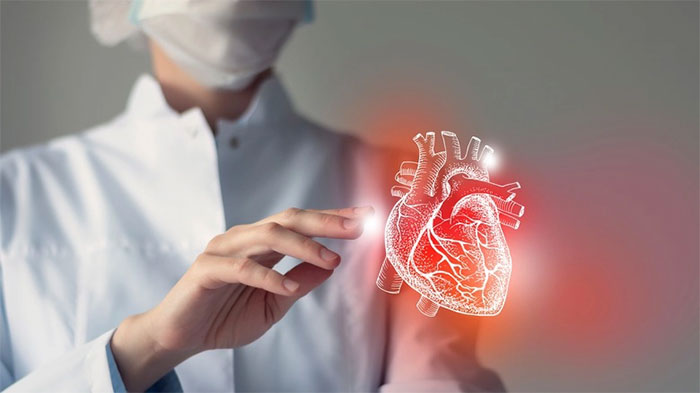What would happen to your body if you lived on Mars?
Space travel has harmful effects on the human body, and living in an anti-gravity environment will inevitably cause certain problems for human bones and joints.
In addition, bleeding in space is a horror to the body, and other problems such as isolation from radiation, suppression of intracranial pressure make weightless injuries difficult. very dangerous to the human body.

Space travel has harmful effects on the human body.
But these are just speculations of scientists, because no one has actually settled on the stars. According to these speculations, colonizing Mars will cause certain effects on the human body.
You will have a weaker heart
Residing on the Red Planet can make your body more susceptible to heart attacks, or at least seriously increase your risk of heart disease.
The University of San Francisco, California (USA) reports that long-term exposure to outer space can actually create substances that are toxic to the human cardiovascular system. This is due to a toxic combination of radiation and a lack of gravity, making it harder for the circulatory system to do its job.
In addition, the left and right ventricles of the heart will both decrease in volume. This can come from a drop in blood and heart muscle. The heart rate of astronauts in space is lower than on Earth. When they stood on the International Space Station ISS, the heart rate was only equivalent to the state of lying before the flight. The blood pressure in space will also be lower than normal.

The circulatory system is greatly influenced by gravity on Earth. For example, the veins in the legs must be able to resist gravity to return blood to the heart. When in space, all the effects of gravity disappear, the shape and size of blood vessels and the heart will change.
But that's not all that matters to the body. According to Dr. Marlene Grenon of Harvard Medical School, low-gravity simulations show that life in zero gravity can even change the way certain genes are expressed in cells - especially those that conduct electricity. heart. Changes in these cells can lead to a higher risk of arrhythmias.
According to ScienceAlert, living in zero gravity or low gravity makes it easier to pump in the body, but this is not a good thing for the body, it will make the heart gradually became lazy and less and less healthy.
Your body will age faster
Gravity plays a huge role in the body's ability to replenish bone tissue, bone and cell function. According to the University of San Francisco, California, when living on the Red Planet, gravity is much weaker than Earth and this can lead to a shortage of bone tissue.
This means that the astronauts residing on Mars are not only more prone to fractures, but they are also losing bone density at an increasingly rapid rate, causing their bone components to age prematurely.
Furthermore, accelerated aging may start with the bones, but it certainly doesn't end there. Newsweek reports in 2021, a new study shows that exposure to radiation in space also causes errors in DNA replication, another problem that causes astronauts to age before their time. . Experts estimate that Mars has 17 times more radiation than Earth.
Weakened immune system
The immune system that helps protect the body from disease is also affected by the outer space environment. Many factors influence this including: radiation, zero gravity, psychological stress, loneliness, changes in circadian rhythms and sleep cycles.

Astronauts' susceptibility to infection is higher in space conditions.
In addition, when living in outer space or Mars, we will be isolated and exposure to bacteria from the astronaut's own body and other members will also change the immune system of the astronauts. surname. The possibility of infection of astronauts is higher in space conditions, where they may be exposed to extraterrestrial agents.
Less stamina
Physical endurance is often measured by the maximum amount of oxygen the body can use during an exercise session. The aforementioned circulatory and motor changes all contribute to the reduction in astronaut physical endurance.
A previous study showed that after 9 to 14 days in space, the maximum amount of oxygen consumed by the body will decrease by 20% to 25%. However, after about 5 to 6 months in zero gravity, the numbers start to improve. This shows that the body has shown signs of adaptation, although it never returns to the original state when on Earth.
- How does human body change in Mars?
- 'Who comes back from Mars:' Is reality or just fiction?
- What will happen in a minute?
- How will the first man on Mars die?
- Discovered an algae that lived up to 2 years in space
- Did the ocean on Mars get into the rock?
- European probes speed up thanks to Mars
- Elon Musk considered moving to settle on Mars
- NASA explains the confusing
- How does the human body change when living on Mars?
- Curiosity traces from space
- Top 10 photos of Mars
 Announced 3 houses on the Moon and Mars
Announced 3 houses on the Moon and Mars Science proves: Mars also knows 'deflated'
Science proves: Mars also knows 'deflated' Elon Musk announced the price for a Mars trip was 11.6 billion VND, free of charge
Elon Musk announced the price for a Mars trip was 11.6 billion VND, free of charge NASA discovered strange 'gate' on Mars, is the hiding place found?
NASA discovered strange 'gate' on Mars, is the hiding place found? What happens to dead bodies on Mars?
What happens to dead bodies on Mars?  How long does it take and how hot does it have to be to burn a body to ashes?
How long does it take and how hot does it have to be to burn a body to ashes?  Top 10 most powerful and surviving animals on the planet
Top 10 most powerful and surviving animals on the planet  Stunned to discover strange, mysterious creatures in Antarctica
Stunned to discover strange, mysterious creatures in Antarctica  Daily habits that are harmful to health that 90% of people have but think they are doing the right thing
Daily habits that are harmful to health that 90% of people have but think they are doing the right thing  Fear - 'a great tool' of innate survival mechanism
Fear - 'a great tool' of innate survival mechanism 